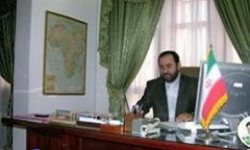ID :
258304
Mon, 10/08/2012 - 10:01
Auther :
Shortlink :
https://oananews.org//node/258304
The shortlink copeid
Envoy Thanks Libyans For Helping Free Kidnapped Iranians

Tehran, Oct 8, IRNA -- Iran's Ambassador to Libya Hossein Akbari thanked Libyan nation and government, here on Sunday for their help to free the kidnapped Iranians.
He made the remarks in an interview with Iran’s state TV, Channel 2.
'Freedom of 7 Iranian Red Crescent aid workers in Libya was the result of joint efforts of both Iranian and Libyan governments and people.'
The high-ranking official thanked Libyan government and local officials as well as the heads of Libyan tribes for their cooperation to help free the kidnapped Iranian citizens.
The 7 Iranian Red Crescent aid workers, who were kidnapped in Libya's Eastern city of Benghazi in August, were set free on Saturday.
The Iranians were heading to the Tibesti hotel when an armed group intercepted them. They were loaded into a different car and whisked away to an unknown location.
The driver of the vehicle, a local volunteer, was not taken. The delegation arrived in Libya early August at the invitation of the Libyan Red Crescent.
Saturday night, Iranian Foreign Minister Ali Akbar Salehi announced that the seven Iranian nationals had been freed and would come back home later in the day.
Salehi noted the extensive efforts made for the freedom of the 7 aid workers in the last two months, and said, 'Fortunately, the 7 Iranian hostages in Libya were freed 65 days after their abduction and were handed over to the Iranian embassy officials in Tripoli following intensive contacts and talks with Libyan officials and the local officials of Benghazi.'
There are still some unrests and rebellions in some parts of Libya after 2011 revolution, but the government has declared that it has control of the country in all areas.
Since the beginning of 2011, the Muslim world has witnessed popular uprisings and revolutions similar to what happened in Iran in 1979.
Tunisia saw the overthrow of Zine El Abidine Ben Ali in a popular revolution in January which was soon followed by a revolution which toppled US-backed Hosni Mubarak in Egypt in February.
Libya was the third country experiencing Islamic Awakening. Libyans also embraced victory after months of bloody campaign against the country's dictator, Muammar al-Qaddafi.
Bahrain, Jordan, Kuwait, Saudi Arabia and Yemen have since been the scene of protests against their totalitarian rulers, who have resorted to brutal crackdown on demonstrations to silence their critics.
In Yemen, although the people have toppled the dictator and elected a president, the revolution still continues as allies and family members of the former dictator, Ali Abdullah Saleh, still hold key posts in the country and have not been brought to justice./end





